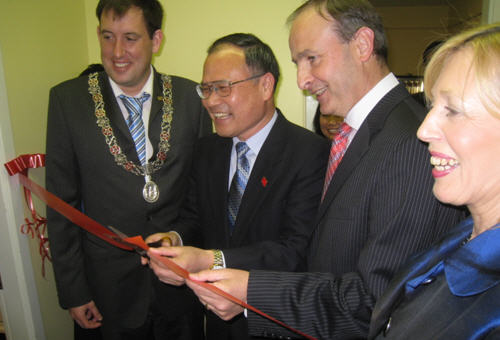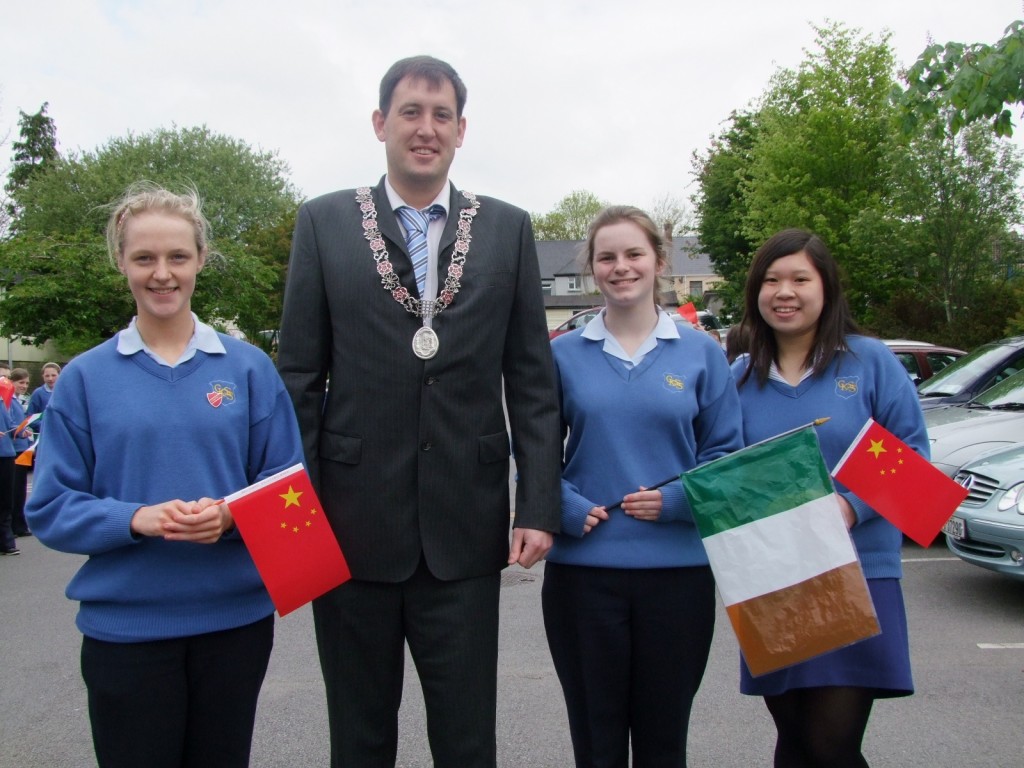
I had the priviledge of deputising last Friday (7 May) at the opening of the new Confucious Room at Christ the King Secondary School on South Douglas Road. Well done to the school on their initiative.
Kieran’s Speech
Minister Martin, Chinese Ambassor, Principal, teachers, students.
There is a tree, a blackthorn, I watched for many years. It grew tall embedded in a country stone wall. Its branches took shape splaying into an adjacent field. For many years, this tree bore leaves. Its youth and vibrancy were seen annually.
I eventually took the tree for granted and forgot about it. I was too busy to notice it and recently a friend of mine showed me the tree and expressed huge concern for it.
Over the years, ivy had grown up the tree embedding itself into the tree’s arteries, stopping the tree from breathing. The ivy had thick branches that hugged and clung strongly. In essence the tree was dying and in past weeks, the tree was cut down; its strangled branches revealing to all present the rotting inner core of the tree.
I always think that schools like trees. They can be strong and stretch out with a motivated community of people behind them. However, as noted above, with the ivy and the blackthorn if unattended, a school does not take long to become a wilderness. This school is certainly not a wilderness – it blossoms from its innovative, progressive and forward looking vision.
The mission of your school is to respect the uniqueness of each person within the school community – that each student adds to the vibrant roots and branches of Christ the King.
Confucious:
I think the new Confucius classroom is a fantastic idea that adds to your mission
But a new room itself brings new meanings to all your lives – you have chosen to celebrate Chinese culture and the schools’ connection with China.
But there in a power of place. This new place in your school is rooted in culture, in tradition, in continuity, change and legacy; those students who sit in htere will be part of the power of education – this new place will become another unique place of direction and experiment, of dialogue, of banter, or stories, of ambition and determination, experiences and learning, of ingenuity and innovation and ultimately those who use the room will hopefully look back at the room as a place of great memories.
You have also chosen to celebrate Confucius.
Confucius is the Latinized name of K’ung Fu-tzu (Great Master K’ung).
Confucious was a teacher in China 1500 years ago. We do not know exactly when Confucius embarked on his teaching career, but it does not appear to have been much before the age of 30. In 518 he may have served as tutor to one of the prominent clans of Lu, the Meng, who wished their sons to be educated in the li, or ritual.
He is alleged to have journeyed to Loyang that year to instruct himself in the traditional Chou ritual. Here he is said to have met a famous Taoist teacher who reportedly turned him away Confucius because he was stuffy and arrogant
Confucius had a vast range of interests.
In particular, he was concerned about the rampant immorality of the government of his time.
He spent much of his life trying to find a ruler who would accept his teaching that ethical considerations, correctness, social justice and sincerity should be the guiding principle of government.
Confucius taught that the primary task of the ruler was to achieve the welfare and happiness of the people of his state. To accomplish this aim, the ruler had first to set a moral example by his own conduct, and this example would in turn influence the people’s behavior.
Confucius rejected the use of a rigid legal system and believed instead that moral custom and voluntary compliance were the best ways of maintaining order in society. Confucius has been considered responsible for editing and writing some of the most important works in the Chinese tradition. According to relatively early sources, he arranged the classical anthology of early Chinese poetry, the Book of Odes
He is also credited with writing parts of the great divination classic, the Book of Changes (I ching), and the book of ritual, the Records of Rites (Li chi). His name is also associated with a work on music, the Book of Music (Yüeh ching), which is now lost.
Confucius was basically a Chinese thinker and social philosopher and one of the greatest teachers in Chinese history. His influence was profound.
Lessons:
I was also taken through doing some research by the following quote by Confucious
“To know your faults and be able to change is the greatest virtue.”
And that for all is one of the hardest things for all of us to do
To change, that involves motivation, development of your talent, self confidence, self pride, self belief and innovation.
People, in this world, we need more of such confidence, pride and belief – we need to mass produce these qualities.
Ladies, now is the time to build your legacy.
If this new room achieves any of those beliefs then, then this room is not just a fitting memorial to Confucious but something a place that is living, vibrant and sparkling with ideas and great journeys of discussion and life fulfilment.
Thanks for having me this morning. I wish to congratulate the school on this another great milestone and the opportunity to speak with you this morning.
